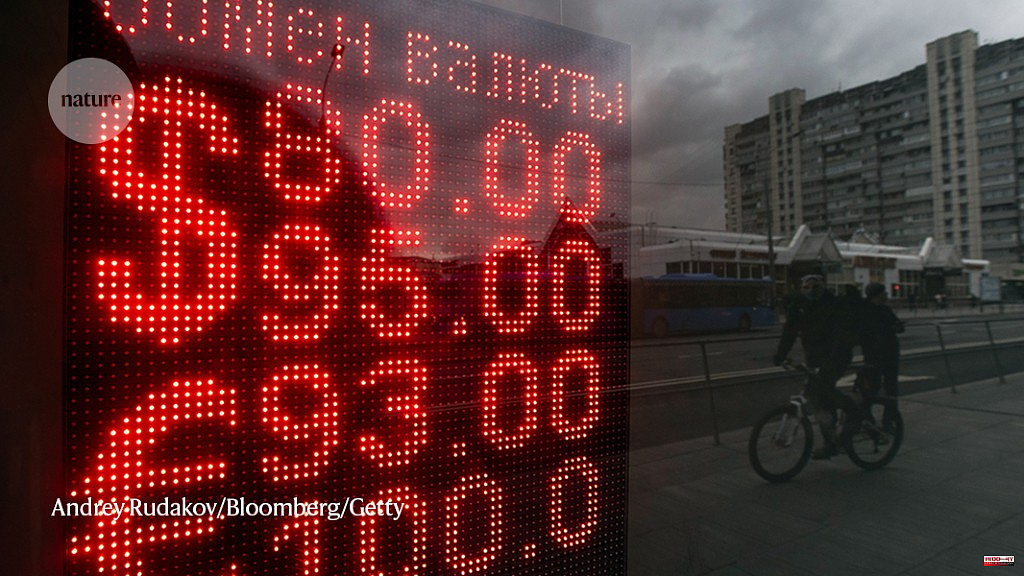Nobody expected that Russia would invade Ukraine on 24 February. The United States, Canada, Japan, Canada, the European Union and the United Kingdom would all respond with sanctions. This latest response to Russia's invasion of Ukraine has had devastating ripple effects, instead of the limited, symbolic sanctions that were used when it annexed Crimea in 2014 and occupied eastern Ukraine in 2014.
Russian banks were denied access to the US dollar, foreign reserve and the Society for Worldwide Interbank Financial Telecommunications (SWIFT), messaging system that banks use to exchange financial information. The United States and its allies prevented the export of high-end semiconductors and software to Russia's technology, defence and manufacturing sectors. According to one US law firm, it is illegal to supply toothbrushes to companies that repair Russian military equipment.
Russia's economy is in a state of flux. The war has decimated the value of Ukraine's currency, hryvnia. Nobody knows what the future holds.
It is amazing to see how it has been possible. By using weapons against the networks that link the global economy together. The supply and financial networks are subject to chokepoints that powerful states can use against individuals, businesses, and entire nations. While some of these chokepoints are well-known, many others remain unknown.
However, there has not been enough academic research on these pressure points. The data needed to make informed decisions is not available to policymakers. While companies have access to information about supply chains, governments and the general public lack this data. Similar data is not available on financial and information networks, as well as their vulnerabilities.
Policymakers have believed for decades that financial markets and production can be managed by themselves with some supervision from regulators. These assumptions do not work in a world where hostile governments can use the weakest points of the global economy to their advantage.
These networks must be mapped by data scientists, political scientists and economists to identify the most dangerous and risky points. The United States began to survey supply relations as a first step. Policymakers would be able to identify vulnerabilities and mitigate them where they are possible with more detailed information.
After the 2007-09 global financial crisis, some reforms were implemented, including stress-testing banks to determine if they can withstand unexpected turbulence. They helped stabilize the global financial system and discouraged risky speculation. However, they are not sufficient to protect against targeted attacks.
Macro-financial risk is something policymakers must consider. Analysts have warned that cutting Russian banks from SWIFT could lead to a global systemic meltdown similar to the one that almost happened in 2008 when Lehman Brothers, an American financial-services company, collapsed. They are concerned that Russian financial sanctions could destabilize payments between counterparties, causing a crisis that could feed itself. These early predictions were wrong. They do highlight the uncertainty of removing major components of a system whose deep workings or sources of stability are still unknown.
The extraordinary efficiency of globalization has resulted in economic growth. Money transfers occur in nanoseconds and not over days or weeks. Complex products like smartphones can be built by hundreds of suppliers across the globe through global supply chains. One country may dominate some supply chains. China, for example, controls almost all stages of photovoltaics production.
These links make economies more interdependent. For efficiency reasons, businesses in different countries may rely on one supplier. This can create risks for those suppliers. German car factories have been left idle as they are unable to obtain Ukrainian-made electronic cabling systems or 'wire harnesses'.
Global economics is not symmetric. It's not an open network of links that provides many other routes if one link fails, contrary to conventional wisdom. It's asymmetric. The flows of finance and trade depend on a small number of hubs with many connections2. Governments can control these hubs to block access by their adversaries to important parts of the global economic network.
In 2019, South Korean courts found Japan liable for forced labor during the Second World War. This threatened the South Korean electronics sector. South Korean companies such as Samsung relied on chemicals and other components to produce their products. They were vulnerable to Japanese pressure, as Japan produced 90% of these precursors.
Some countries or companies hold disproportionate power in areas such as finance and trade. SWIFT, for example, is located in the EU but is managed by banks that depend on the US financial systems. Transactions between non-US party often depend on US dollars. This means they must be cleared through a few US-regulated financial institutions. Silicon Valley, California is home to a lot of the most advanced technology and computing in the world.
Attacks on chokepoints could quickly cause disruption to the entire network. The EU and the United States cut Iran out from the global financial system in 2012 by refusing its banks access the SWIFT and dollar clearing services. It was difficult for Iranian companies to get oil payments, which led to a sharp drop in oil exports. Complex barter arrangements were created: oil was traded for tea, zips, and bricks. These impacts can be more severe than general shocks like the COVID-19 pandemic, which caused supply-chain disruptions. The US's denial of certain Russian banks access to the Dollar effectively excludes them from the global financial system.
Others could also be brought in line. The United States also has control over crucial intellectual property and software design for semiconductors. Non-US-based semiconductor companies, such as the Taiwan Semiconductor Manufacturing Company (Hsinchu), are adhering to the US ban on Russian exports. If they don't cooperate, China-based producers, like the Semiconductor manufacturing International Corporation in Shanghai will be subject to sanctions.
Both governments and businesses need to be prepared for disruptions caused by intentional shocks. The fallout can be hard to predict.
There are many vulnerabilities that are well-known. China is the world's largest producer and refiner of rare-earth element, such as cerium or yttrium. These elements are used in many products, including mobile phones and wind turbines. China stopped shipments to Japan of rare-earth element in 2010 after a dispute about a captured fishing boat. This raised fears that China could use its market dominance as a tool for coercion and retaliation. Although China has played a key role in the processing of these elements, its share of rare-earth production has declined from a near monopoly to less than 60% since 2010.
Similar to cars, watches, and phones, many vehicles rely on GPS to locate their location. GPS is a military invention and is subject to federal regulation. This has led Russia, China, and the EU, to develop their own satellite positioning systems at a cost of billions.
Others vulnerabilities are even more difficult to identify. Businesses are the only ones who know exactly what their supply chains look like. Even that knowledge is imperfect. They may know their first-tier suppliers (those with whom they are in direct contact) and their second-tier supplier (those who depend on their first-tier providers). Things get complicated after that.
Only when another disaster, war or pandemic happens to reveal them, more weak links may be found. Few people knew or cared before the COVID-19 epidemic that one German manufacturer produced approximately 75% of the machines required to produce high-quality medical masks. A small group of wealthy countries dominates vaccine manufacturing. Although they are not specifically weaponized, this concentration in production power has allowed rich countries to be at the forefront of the line for messenger RNA-based COVID-19 vaccinations, while the less fortunate countries wait for adequate supplies.
The global financial system has key aspects that are difficult to understand and regulate. It is difficult to determine the amount of money hiding in tax havens, and it is hard to control or assess offshore dollars. Dark pools, which are large quantities of complex financial instruments that are traded on the open market, can be opaque to outsiders.
It is difficult to predict the impact of such a small amount of information. Even small efforts to arm global networks can have huge unanticipated results. In 2018, for example, the United States "designated" Oleg Deripaska, a Russian oligarch, and his companies. This meant that US businesses could not have any dealings with them and businesses from outside the United States couldn't facilitate their transactions. Customers and suppliers to huge conglomerates like the Moscow-based aluminium processor United Company Rusal were put in legal peril. Soon it became apparent that Rusal could be a disaster for European car manufacturers and other businesses. Effectively, the United States ended some of these sanctions by requiring Rusal to reduce Deripaska’s ownership stake.
If powerful governments exploit chokepoints they run the risk of escalation, disruption, and retaliation. Food markets are already being affected by the conflict in Ukraine. Together, Russia and Ukraine account for around 30% of the world's wheat production. Ukraine is a major importer of barley (corn) as well as a producer of nearly half of the world's sunflower oils by volume. Russia and Belarus together produce 31% of the global potash, a key ingredient in fertilizer. Fertilizer shortages can lead to food shortages and increased human suffering.
Russia countered by threatening to block nickel exports and stop gas flow to Western Europe. The Russian government has placed its own, largely symbolic, financial sanctions on US officials. These sanctions could prove to be counterproductive in the long-term. Russia must earn hard currency through exports. Many of its products are easily bought elsewhere. Nevertheless, there is a high chance of economic disruption in the coming years.
Russian retaliation could lead to a vicious cycle of counter-retaliation. The debates on cybersecurity and nuclear war focus on the possibility that a common understanding of a "ladder for escalation", which can be used to reduce risks, could help. There is no common picture of weaponized economic network.
It is possible that countermeasures will be deterred by the strong network of nations in the North Atlantic Treaty Organization (NATO) and their allies. Target countries may also consider other options to retaliate. Fears of economic sanctions fueled Nazi Germany's attempts to seize territory in order to protect itself from external pressure7. Iran attacked shipping in Strait of Hormuz in order to block global energy flows.
The economic coercion and the fallout of military coercion can cause havoc in a global interconnected world. It could make it difficult for governments to collaborate to address international problems such as climate change and pandemics.
Researchers from all disciplines are required to collaborate in order to address weaponized networks.
The first step in mapping the global networks is to identify them. The administration of US President Joe Biden has identified the urgent priority of addressing the shortage in supply-chain data. It is unclear if Congress will allocate sufficient funds to address the problem. Other governments must also gather data and think about how to minimize security risks by sharing it. The United States and Europe have already done preliminary mapping to identify broad areas of dependence, including battery production.
Network vulnerabilities should be a top priority for researchers. Network analysis algorithms can help identify bottlenecks8. Economic models can be used to test the resilience of networks to external shocks and attacks. It is necessary to gain a qualitative understanding of global finance politics, alliances, and their relationships. Dependencies between networks require study. Oil markets, for example, are quite robust because one source of oil can be substituted reasonably easily. However, oil shipping relies on financial networks10 as well as shipping insurance, which both have chokepoints.
Before vulnerabilities can be exploited, policymakers need to assess the best way to mitigate them. Specifics will determine the strategy. As with rare-earth elements, substitutes and other suppliers may be possible. Some countries, such as Australia and the United States, are starting to accept the negative environmental effects of processing rare-earth element mining to challenge China's dominance.
As South Korea did, government might provide subsidies to domestic suppliers. This might be more complicated than it appears. Businesses might prefer to work with existing partners because supply relationships can be complex. It has been difficult for South Korea to reduce its dependence upon Japanese electronics materials. The US and EU are divided on domestic politics, making it difficult to reach an agreement about whether to increase renewables, expand nuclear energy, or frack for oil and gas. It is difficult to understand the implications of changing security for energy transition and climate change after Russia's invasion.
Supply relationships could be strengthened by arrangements between like-minded countries, if possible. The US and EU are increasing their cooperation in advanced technology production, and other countries may be interested in joining them. Materials scientists and engineers will need to find alternative inputs if cooperation is not possible.
Sometimes the vulnerabilities can't be eliminated. China relies on foreign manufacturing facilities (or 'fabs') to produce advanced semiconductors. Despite receiving substantial industrial subsidies, China has not been able to keep pace with cutting-edge technologies and processes despite its huge dependence on them. These vulnerabilities require difficult and sometimes political trade-offs between national security and economic progress.
It will be more difficult to set up financial networks. The cold war saw the creation of the SWIFT system as well as dollar-clearing networks. Few people paid much attention to the strategic implications of these networks, for better or worse. It will be difficult for countries that don't like the dominant networks to develop attractive alternatives in a climate of distrust. They may find ways to work around the problem. Iran, for example, created a secret financial micro-system in order to avoid the US sanctions. Russia wants to stop transacting in US dollars. Economists suggest that India may try to preserve its neutrality while becoming a safe haven of politically risky financial assets.
Researchers need to ask the following key questions: Under what circumstances could the network structures that the United States of America and the EU have weaponized begin to crumble, to be replaced with alternative networks or a less fragmented global economic system?
To find the answers, we will need to explore the hinterlands of economics, politics, and macrofinancial histories, as well network science, complexity, geography, and materials science. Social scientists must create integrated models to understand how these economic and political strategic choices interact, and gather data to refine and test them.
As countries seek to exploit vulnerabilities of others, or secure themselves, the actions against Russia will increase global economic network weaponization. These security risks can be understood and mitigated by establishing links between researchers.












